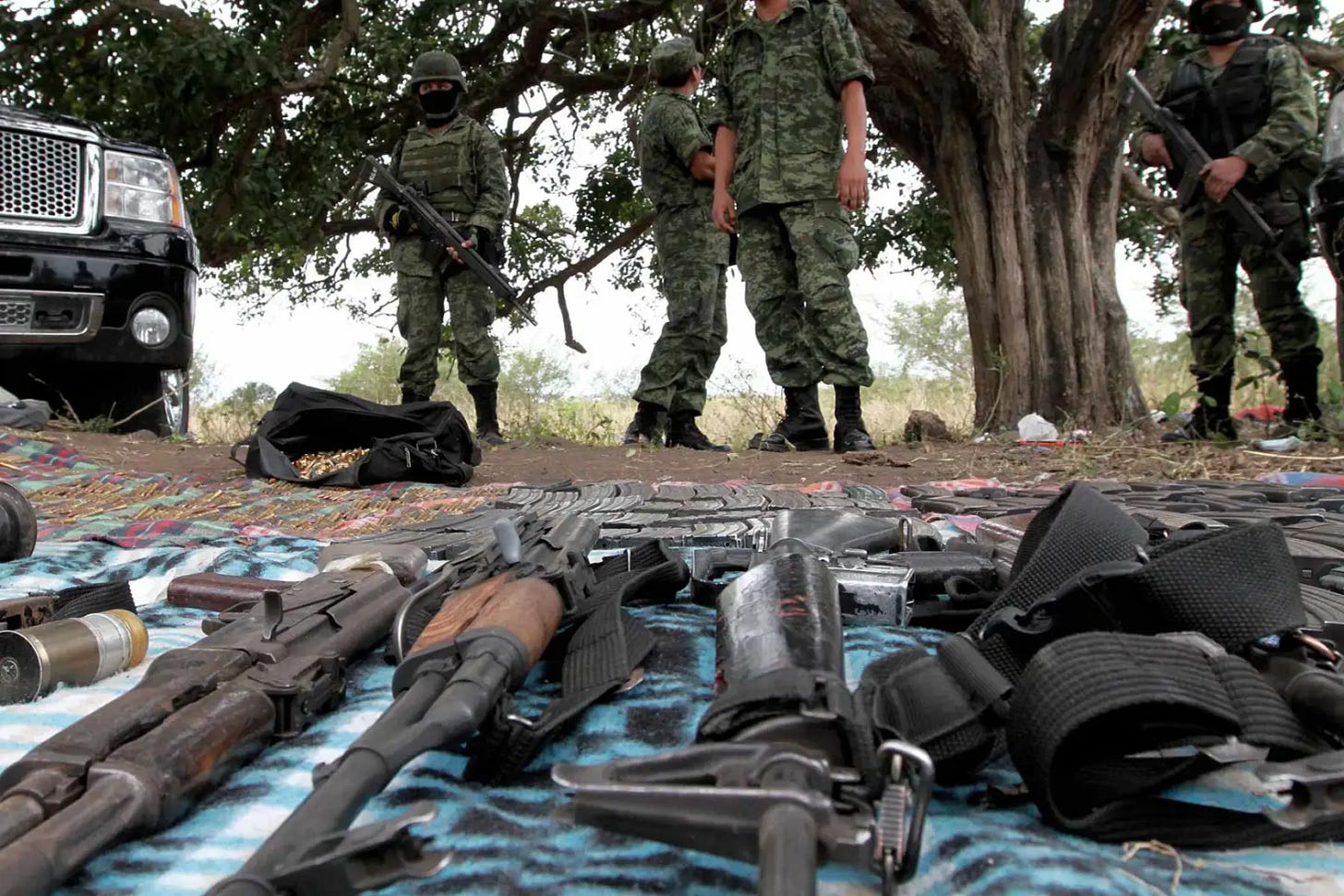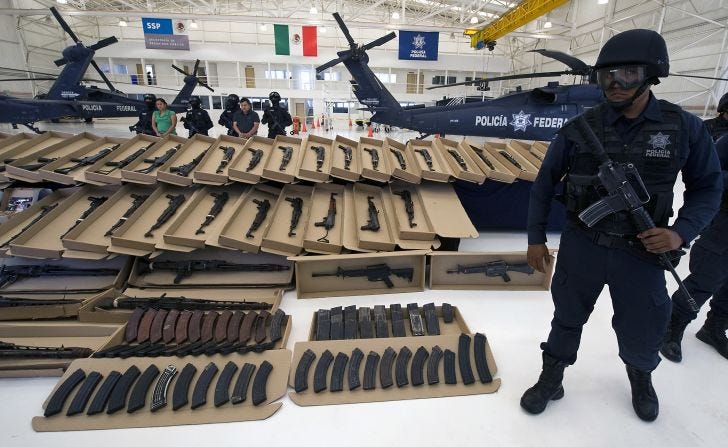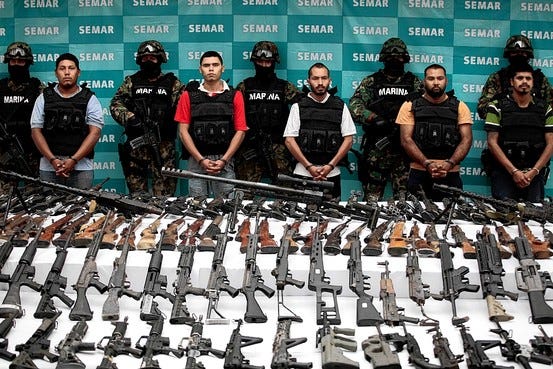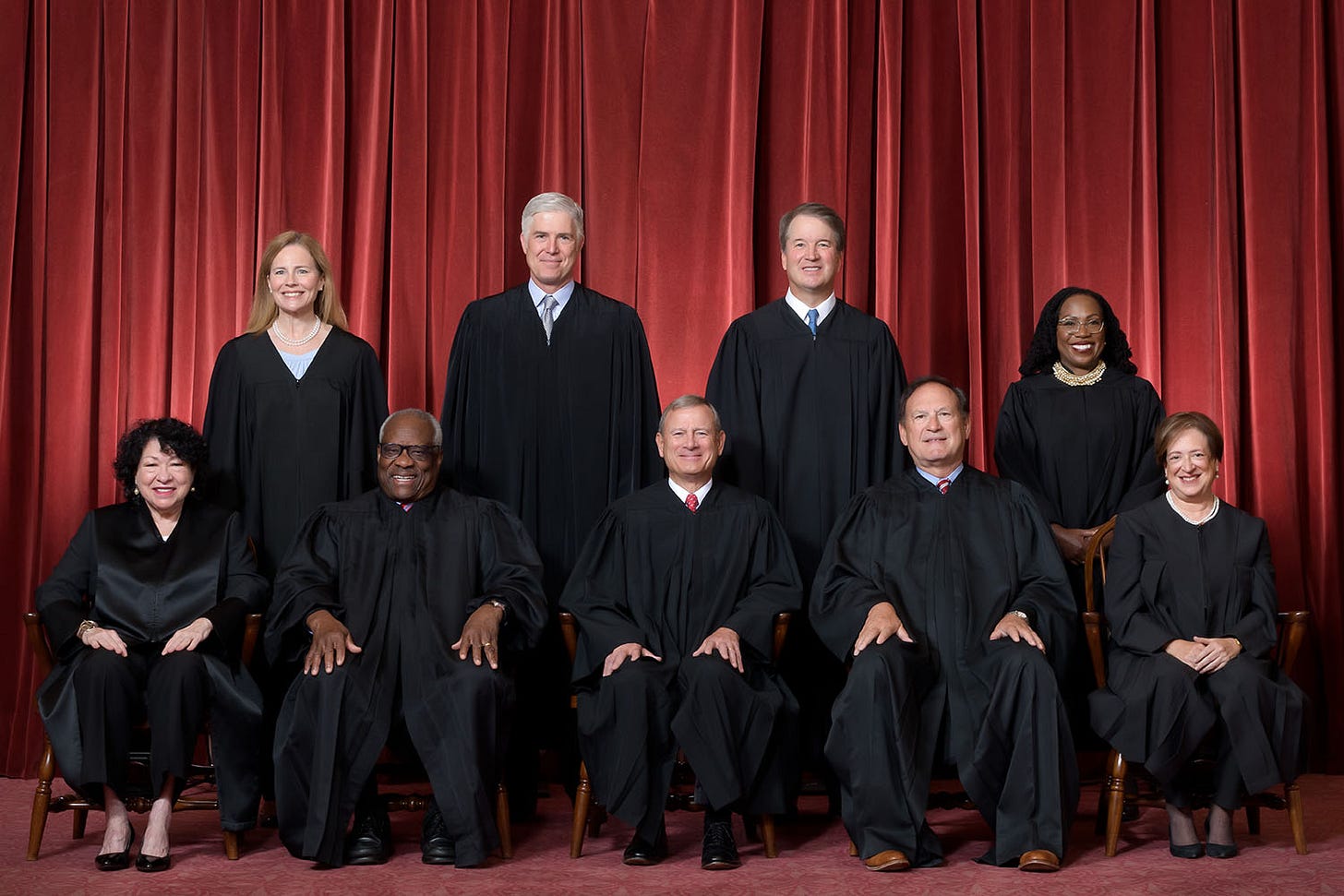Guns vs Border Security
Next month, the Supreme Court will consider a case that could shake up things for American gun manufacturers in consequential ways. In Estados Unidos Mexicanos v. Smith & Wesson, Mexico says US gun makers have knowingly allowed drug cartels to commit acts of violence by failing to prevent guns from being trafficked across the border.
Mexico says that gun companies design, market, and distribute those guns in ways that make it easier for criminals to access them – even going so far as to directly appeal to cartel buyers in their advertising.
For example, the Connecticut Mirror found three models of Colt firearms designed with Spanish names and Aztec symbols representing Mexican independence.
Mexico is asking for $10 billion in damages, along with stricter regulations for the US gun industry. They want better record keeping, more sales audits, stronger background checks for buyers, and an end to what they say are illegal marketing practices. In return, the $10 billion will help strengthen Mexico’s security efforts and reduce the flow of guns from the US into Mexico and drugs from Mexico into the US.
The Supreme Court is considering two things:
Are US gun makers responsible for the harm Mexico is claiming, since their guns end up being used by drug cartels?
Can gun makers be held liable for illegal gun trafficking?
Mexico hopes to clarify whether a specific US law, the Protection of Lawful Commerce in Arms Act (PLCAA), should apply in a cross-border situation. The PLCAA says that US gun makers cannot be held liable if their products were used in the commission of a crime.
The PLCAA was passed in 2005 because gun makers were being bombarded gun with lawsuits saying they create deadly products. Seeing the writing on the wall, Congress passed the immunity law to keep the gun manufacturers from going bankrupt.
There are some carve outs in the immunity, though — gun makers are not allowed to engage in knowingly deceptive marketing practices, to manufacture faulty products, or to violate other laws while selling their firearms. Mexico believes this exception should apply in this case because the gun makers are violating anti-trafficking laws while aiding and abetting the cartels in their illegal activity.
The Supreme Court must decide whether the case can move forward or whether the gun makers are immune from liability.
This particular case presents a challenging and timely dilemma, as it also centers around a topic that 80 percent of Americans believe the government has majorly botched: border security.
Historically, the NRA has strongly supported Trump. This case puts the Trump administration in between a rock and a hard place — how does he keep the gun lobby happy while also fulfilling a campaign process to beat back the cartels? In the argument between “safer borders” and the “Second Amendment,” who wins?
A healthy American gun industry combined with relatively lax gun laws creates ample opportunity for smuggling. According to the Bureau of Alcohol, Tobacco, Firearms, and Explosives (ATF):
Between 250,000 and 1,000,000 firearms are smuggled annually from the United States into Mexico, (according to a CBS investigation)
Up to 85 percent of guns found at Mexican crime scenes came from the US
73 percent of guns used to commit crimes in Mexico between 2022-2023 were sold in one of the three border states (California, Arizona and Texas)
Mexico itself makes buying a gun very difficult. Although its constitution guarantees the right to bear arms, guns must be federally registered to licensed owners. And get this – there’s only one store in the whole country where you can legally buy a gun.
The US, on the other hand, has no such standards -- and more than 20,000 places to purchase a gun in the four border states alone. So, some people working for the cartels can simply cross the border and buy a gun.
Cartels also regularly utilize “straw purchasing,” in which they pay Americans to legally buy guns to be handed off to cartel members and smuggled across the border.
Supporters of Mexico’s lawsuit argue that gun makers should hold some degree of responsibility when their products are used to break the law, given the extraordinary human cost of cartels and fentanyl trafficking.
Critics argue that holding gun makers responsible for how criminals use guns sets a dangerous precedent, constitutes foreign overreach into US policy, and goes after Second Amendment rights. In their view, holding gun makers responsible will lead to more restrictions on guns as a whole, making it harder to own or buy them.
Ted Cruz and other Republicans filed an amicus brief in support of the gun makers, calling the lawsuit an “assault on our Second Amendment” and telling Fox News that SCOTUS should waste no time in “ending this madness.”
Possible implications of SCOTUS’ decision
Ruling against Mexico would bolster the gun industry’s confidence in its federal protections, discouraging manufacturers from prioritizing safety. It could also put more pressure on already-strained relations with Mexico, which shares the US’s interest in safer borders, but often disagrees on how to achieve them.
Siding with Mexico, on the other hand, could upend the broad protections of the PLCAA, force the creation of stricter regulations, and cause an uproar among pro-gun advocates, who may see it as a betrayal of Trump’s promises to uphold the Second Amendment.
Any way you slice it, his SCOTUS is opening itself to serious public scrutiny.
No matter the decision, the stakes here couldn’t be much higher - on both sides of the border. The outcome of this case could have a momentous impact on the gun industry, US-Mexico relations, and accountability at the border, and it forces Trump into an uncomfortable challenge by demanding reconciliation between his keystone border security platform and passion for the Second Amendment.







It seems hypocritical to me that the US does not want to take responsibility for the guns that cross the border into Mexico, but they blame Mexico for the drugs that cross the border into the US. Especially when statistically, the drugs come into the country with people coming into the country legally.
I’d love to see US gun manufacturers go out of business. I know it won’t happen, but a girl can dream.